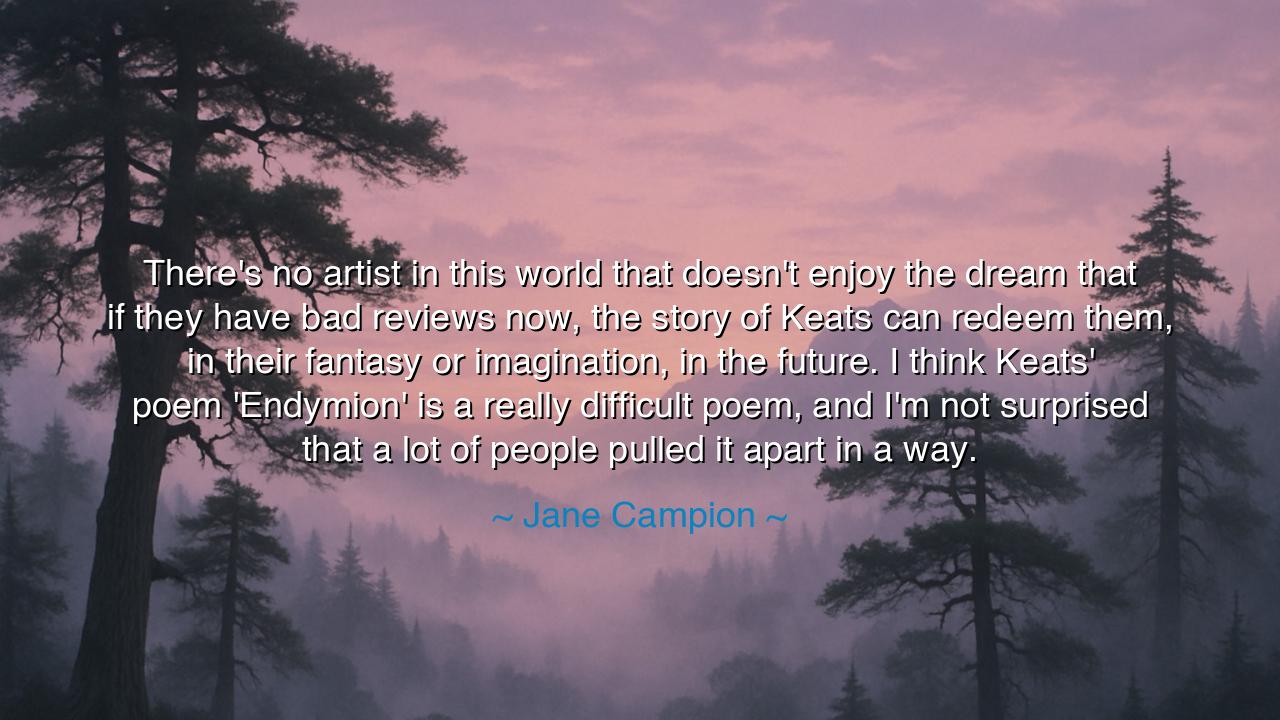
There's no artist in this world that doesn't enjoy the dream that
There's no artist in this world that doesn't enjoy the dream that if they have bad reviews now, the story of Keats can redeem them, in their fantasy or imagination, in the future. I think Keats' poem 'Endymion' is a really difficult poem, and I'm not surprised that a lot of people pulled it apart in a way.






“There's no artist in this world that doesn't enjoy the dream that if they have bad reviews now, the story of Keats can redeem them, in their fantasy or imagination, in the future. I think Keats' poem Endymion is a really difficult poem, and I'm not surprised that a lot of people pulled it apart in a way,” said Jane Campion, the visionary filmmaker and poet of cinema. Her words carry both tenderness and truth, for she speaks to the artist’s eternal longing for redemption — that sacred hope that time will one day vindicate what the present cannot yet understand. In her reflection lies a lesson as old as art itself: that genius is often met first with mockery, that beauty is seldom recognized when it is new, and that imagination, misunderstood in its hour, may one day become the mirror of eternity.
The name Keats resounds through history as the emblem of the misunderstood artist. When his poem Endymion appeared in 1818, it was met not with praise, but with scorn. The critics of his time — proud guardians of “good taste” — tore it apart, mocking his youthful fervor and romantic idealism. They could not see the fragile grandeur of his vision, nor the wild sincerity of his soul. Yet Keats, undeterred, continued to write — to dream, to sing, to believe that beauty and truth are one. He died young, scarcely twenty-five, believing himself a failure. But time, that patient judge, lifted his name among the immortals. His words became the heartbeat of poetry itself. This is the story of Keats, the dream that every artist carries: that though the world may scorn, time will understand.
Campion, herself a creator who has faced the harsh winds of criticism, knows this truth deeply. Her films — The Piano, Bright Star, The Power of the Dog — are woven from the same threads as Keats’ poetry: sensual, mysterious, filled with emotion and ambiguity. Like Keats, she creates not for applause, but for revelation. And so she speaks of the “fantasy or imagination” that sustains every artist — that gentle hope that history may someday see what the present cannot. For artists live not only in the moment, but in the dialogue between now and forever. When the world mocks them, they find solace in the thought that posterity might listen more kindly.
To be an artist is, in truth, to dwell in the tension between creation and rejection. Every painter, poet, or filmmaker must confront the world’s blindness — the pain of being seen and yet unseen. But Campion reminds us that even this pain is a form of faith. For the artist’s imagination is not only the source of art, but also the shield against despair. It whispers that there is meaning in the struggle, that truth and beauty are never lost — only delayed in their recognition. The hope of Keats becomes the torch passed down through generations of creators, lighting their way through the darkness of misunderstanding.
Consider the story of Vincent van Gogh, whose brush captured the trembling soul of the world in color and light. In his lifetime, he sold almost nothing; his paintings were dismissed as madness. Yet his faith in the unseen — his belief that art transcends approval — led him onward. Today, the very works once ridiculed are revered as masterpieces. Like Keats, he was redeemed by time — and by the enduring power of imagination to outlive judgment.
Campion’s reflection, then, is not one of arrogance, but of humility and hope. She does not mock her critics; she recognizes the timeless pattern — that innovation confuses before it enlightens, that depth is often mistaken for difficulty. She even admits that Endymion is “a really difficult poem,” acknowledging that the work’s obscurity was real. Yet within that difficulty lay its beauty — the beauty of a mind reaching beyond the known, daring to touch the divine. So too, she suggests, the artist’s task is not to please, but to reach, to imagine beyond what is easily understood.
And so, let this be the lesson for all creators and dreamers: Do not measure your worth by the noise of the moment. The applause or the silence of today cannot define the value of what you create. The world’s understanding is slow, but truth endures. Be like Keats, who wrote even when unseen; be like Campion, who creates despite criticism. Let imagination be both your art and your armor, your compass through the storm of doubt. For time is the final critic, and eternity has a tender heart for those who dared to dream.






AAdministratorAdministrator
Welcome, honored guests. Please leave a comment, we will respond soon